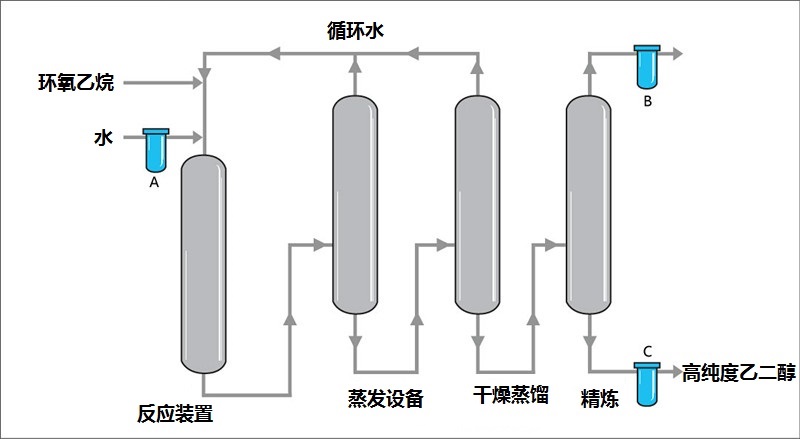Ethylene glycol is injected into the subsea wellhead as a hydrate inhibitor to provide fluidity guarantee for deep-water submarine pipelines. Natural gas plants often use glycol solvents to remove moisture from wet natural gas to meet pipeline quality inspection requirements or adjust gas to remove condensate. In the glycol dehydration process, the humidified gas is fed into the glycol contactor, where it contacts the lean water glycol. The poor water glycol absorbs water to form rich water glycol, and then flows to the regenerator, where it is thermally separated into ethylene glycol and water, and the regenerated ethylene glycol is reused. Water vapor escapes from the top of the regenerator to the atmosphere, and the lean water glycol returns to the recirculation contactor. The intrusion of hydrocarbon liquid and particulate matter is the main reason for the production of glycol foam. Foam will increase glycol loss and reduce production capacity. The ethylene glycol entering the dry natural gas can contaminate downstream equipment and cause potential problems in pipeline quality inspection and natural gas quality. Filters play a great role in the ethylene glycol recovery system (MRU) and the removal of particulate impurities, ensuring the normal production and operation of deepwater gas fields.
SP Solution:
SP strictly controls the fluctuation of the pollution level, thereby optimizing the productivity of the ethylene glycol plant and ensuring that the final product highly meets the technical requirements. The self-developed filter element can reduce the level of suspended solids to less than 5 ppm, maintain the color transparency of ethylene glycol, and reduce related foam and pollution problems. Can control foam and pollution cost-effectively. By maintaining glycol cycle efficiency, natural gas plants can increase productivity and reliability and achieve acceptable water content. With innovative design and high-efficiency filter materials, the midstream glycol filtration solution can prevent problems before they occur and improve performance. The plant maintains the conversion rate by using excess water. Ethylene glycol is refined through vacuum fractionation. The excess water is removed and recycled in a series of evaporators to produce refined ethylene glycol.
SP Advantages:
ØHigh filtration efficiency and reproducible performance.
Ø Easy to replace and long service life.
Ø Large processing capacity, saving operating costs.
ØAdvanced filtration system, optimized design, good defoaming effect.


